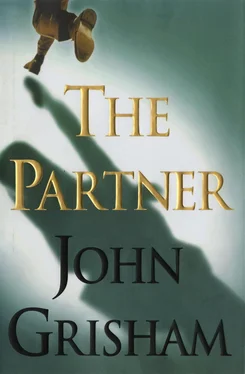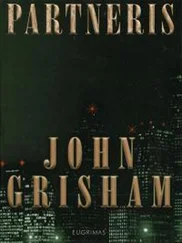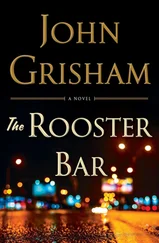“No, he can’t. But here’s the catch. He won’t know about Clovis unless I tell him, but I have to tell him before he’ll drop the murder charges. Now, telling him about Clovis is one thing, but testifying in court is another. He can’t make me testify in court if he tries me for mutilation. He’ll be pressured to try me for something, because, as you say, he can’t allow me to walk away. He can try me, but he can’t convict me because I’m the only witness and there’s no way to prove the burned body was that of Clovis.”
“Parrish is screwed from all sides.”
“Correct. The federal charges are gone, and when we drop this bomb Parrish will feel enormous heat to nail me for something. Otherwise, I walk.”
“So what’s the plan?”
“Simple. We take the pressure off Parrish and allow him to save face. You go to Clovis’ grandchildren, tell them the truth, offer them some money. They’ll certainly have the right to sue me once the truth is known, and you can assume they’ll do it. Their suit isn’t worth much because they ignored the old man most of their lives, but it’s a safe bet they’ll sue anyway. We cut them off at the pass. We settle with them quietly, and in return for the money they agree to pressure Parrish not to press charges.”
“You scheming bastard.”
“Thank you. Why won’t it work?”
“Parrish can prosecute you regardless of the family’s wishes.”
“But he won’t because he can’t convict me. The worst scenario for Parrish is to take me to trial and lose. It’s much safer for him to hit the back door now, use the family as an excuse, and avoid the embarrassment of losing a high-profile case.”
“Is this what you’ve been thinking about for the past four years?”
“It has crossed my mind, yes.”
Sandy began pacing along the foot of the bed, deep in thought, his mind clicking away and trying to keep up with his client’s. “We have to give Parrish something,” he said, almost to himself, still walking.
“I’m more concerned with myself than Parrish,” Patrick said.
“It’s not just Parrish. It’s the system, Patrick. If you walk away, then you’ve effectively bought your way out of jail. Everybody looks bad but you.”
“Maybe I’m only concerned with me.”
“So am I. But you can’t humiliate the system and expect to ride off into the sunset.”
“Nobody made Parrish run and get a capital murder indictment. He could’ve waited a week or two. No one made him announce it to the press. I have no sympathy for him.”
“Neither do I. But this is a hard sell, Patrick.”
“Then I’ll make it a bit easier. I’ll plead guilty to the mutilation, but with no jail time. Not one single day. I’ll go to court, plead guilty, pay a fine, let Parrish get credit for a conviction, but then I’m outta here.”
“You’ll be a convicted felon.”
“No, I’ll be free. Who in Brazil will care if I get a slap on the wrist?”
Sandy stopped the pacing and sat on the bed beside him. “So you’ll go back to Brazil?”
“It’s home, Sandy.”
“And the girl?”
“We’ll either have ten kids, or eleven. We haven’t decided.”
“How much money will you have?”
“Millions. You gotta get me out of here, Sandy. I have another life to live.”
A nurse barged through the door, flipped on a light switch, and said, “It’s eleven o’clock, Patty. Visiting hours are over.” She touched his shoulder. “You okay, sweetie?”
“I’m fine.”
“You need anything?”
“No thanks.”
She left as fast as she came. Sandy picked up his briefcase. “Patty?” he said.
Patrick shrugged.
“Sweetie?”
Another shrug.
Sandy thought of something else when he got to the door. “A quick question. When you drove the car off the road, where was Clovis?”
“Same place as always. Strapped in the passenger’s seat. I put a beer between his legs and wished him farewell. He had a smile on his face.”
By 10 A.M. in London, the wiring instructions for the return of the loot had not yet arrived. Eva left her hotel and took a long walk along Piccadilly. With no particular destination and no schedule, she drifted with the crowd, gazed at the store windows, and enjoyed life on the sidewalk. Three days in solitary had sharpened her appreciation for the sounds and voices of people hurrying about. Lunch was a warm goat cheese salad in the corner of a crowded ancient pub. She absorbed the light, happy voices of people who had no clue as to who she was. And they didn’t care.
Patrick had told her his first year in São Paulo was often exhilarating because not a single person knew his name. Sitting in the pub, she felt more like Leah Pires than Eva Miranda.
She began shopping on Bond Street, first for the necessities — undergarments and perfume — but before long it was Armani and Versace and Chanel, with little regard for price. She was a very wealthy woman at the moment.
It would have been simpler, and certainly less dramatic, to wait until nine and arrest them at the office. But then their work habits were erratic, and one, Rapley, seldom left home.
A predawn raid was chosen. So what if it scared them and humiliated them in front of their families. So what if the neighbors were drawn to the commotion. Catch ’em while they’re sleeping or in the shower, that would be the best tactic.
Charles Bogan answered the door in his pajamas, and began crying quietly when a U.S. Marshal, a man he knew, produced handcuffs. Bogan had lost his family, so at least he was spared some of the shame.
Doug Vitrano’s wife answered the door and was immediately hostile. She slammed it in the faces of two young FBI agents, who waited patiently as she ran upstairs to get her husband out of the shower. Thankfully, the kids were asleep when they put Doug in the back of the car, handcuffed like a common criminal, and left her on the front steps in her nightgown, cursing them and crying at the same time.
As usual, Jimmy Havarac had gone to bed blind drunk and the doorbell proved inadequate. They called him from a cell phone as they sat in his driveway, and he was eventually aroused and arrested.
Ethan Rapley was in the attic when the sun rose, working on a brief, oblivious to day or time. He heard nothing below. His wife was awakened by the knocking on the door, and she climbed the steps to deliver the bad news. First, though, she hid his gun. He kept it in a drawer in his dresser. He looked for it twice as he searched for the right pair of socks. But he wouldn’t ask her for it. He was afraid she would tell him where it was.
The lawyer who founded the Bogan firm had been promoted to the federal bench thirteen years earlier. He had been nominated by Senator Nye, and once he left the firm Charles took over. The firm had strong connections with all five sitting federal judges, and so it was no surprise that the phones were ringing even before the partners were reunited at the jail. At eight-thirty, they were transported in separate cars to the federal courthouse in Biloxi for a hastily arranged appearance before the nearest federal Magistrate.
Cutter was irritated by the speed and ease with which Bogan pulled strings. While he didn’t expect the four to stay in jail pending their trials, neither could he accept the sudden hearing before a Magistrate barely out of bed. And so Cutter tipped the local newspaper, and then he tipped the TV station.
The paperwork was prepared and signed quickly, and the four left the courthouse, on foot, unshackled, free to walk the three blocks to their offices. They were followed by a large, clumsy boy fumbling with a minicam and a young, green reporter who wasn’t sure what the story was, but had been told it was huge. No comments from the stern faces. They made it to their office building on Vieux Marche, and locked the door behind them.
Читать дальше












